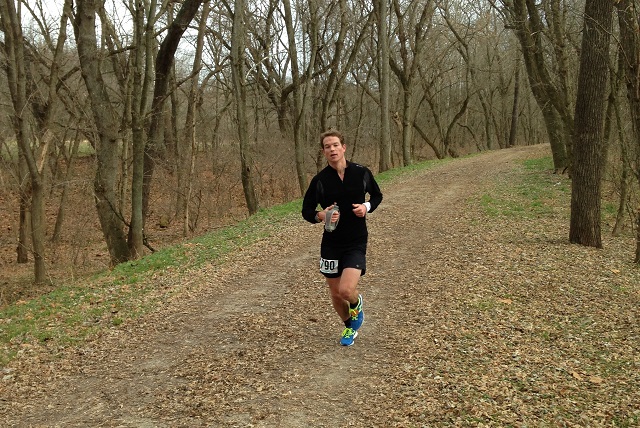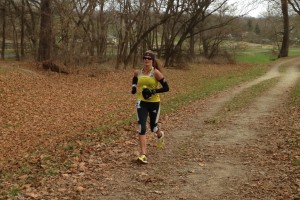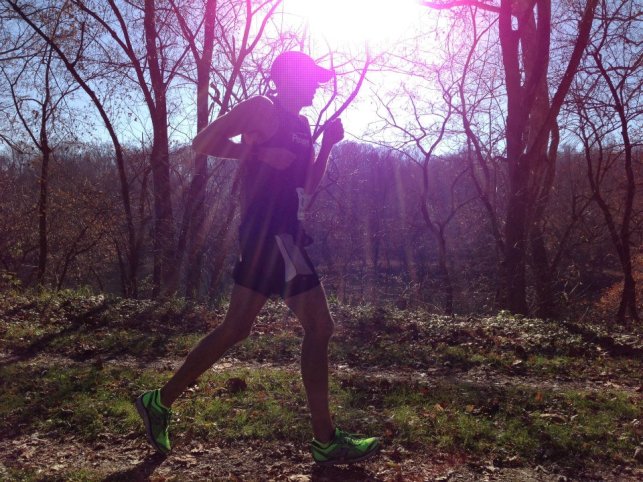
Even after 50 miles of running, Zach Miller was still happy to be out on the JFK 50 Mile course.
For a guy who spends five months at a time at sea, the latest champion of the east coast’s big fall ultramarathon doesn’t take any time on land for granted. Miller, not to be confused with 2003 runner up Zachariah Miller, is based in Columbia, Pa., but that’s just a place his junk mail shows up while he’s on the boat. Results
“It’s good and it’s bad,” Miller said about his job operating printing equipment on cruise ships. “I’ve gotten to run on five continents and I’ll be able to do South America soon, but I really can’t get fast running 10 miles a day on a treadmill.”
That didn’t stop him from pulling away from Ultra Race of Champions winner Rob Krar somewhere between mile 33 and 38 and cruising to victory in 5:38:53, the third fastest time on the course and the youngest, at 25, under 5:40. Krar did not finish the race. Matthew Flaherty of Bloomington, Ind. was second in 5:44:37 and Arlington’s Michael Wardian, he of two marathons in a single day earlier in the week, finished third in 5:55:37.
“When they said I was going to come in under 5:40, I couldn’t believe it,” Miller said. “Only two guys had done that before, and one was Max King (2012 winner and course record holder at 5:34:59).”
Miller’s job affords him months-long vacations, and this one included a road trip to Nevada for the USATF 50k trail championships. A sixth-place finish helped convince JFK race director Mike Spinnler to let Miller into the race, though he didn’t decide on it until a few days before.
“I got the okay but I really had to think about if I really wanted to do it,” he said. “A 50 mile is a lot different from a 50k. I had never run more than 35 miles before.”
Whatever pre-race worries seemed quaint in retrospect of a race that came together “perfectly.” He took the 13 miles of alternating road and technical Appalachian Trail easy, cautiously navigating the rocks.
“I wanted to make sure my ankles came out of it,” he said. “I was falling back, but there was plenty of race left.”
When he and Jason Wolfe hit the C&O Canal Towpath for 26.3 miles, they took down the pace, but Miller considered that he might be running on borrowed time, though it was Wolfe who didn’t finish.
“I thought if we kept sub-6:00 pace up too long, I might blow up by mile 25,” he said. “I was working pretty hard, but once I caught up with Rob (Krar) and found out who he was, I was just happy to be up there with him. I was floored just to be in a position to be second to him.”
Miller didn’t know the kind of lead he had, or that Krar had dropped out, until he hit a tight turn with a little more than eight miles to go. On the rolling hills headed into Williamsport, Md. he tried to reconcile some of the splits he got from escort vehicles, 6:15 for one mile, with the fact that he had never pushed his body that far in a race.
“I was in the great unknown,” he said. “I was just seeing what I could do at that point, it felt like it was all adrenaline. I nailed the nutrition, because you have to take a lot of food to keep going. I think I had a banana at every aid station and my homemade gu.”
Oddly enough, the former Rochester Institute of Technology 10k runner might be well suited for ultra running because of his job situation.
“I don’t have the opportunity to train for a fast marathon, but I can get really strong,” he said. “When were at port, I go out and run because that’s my chance to get off the treadmill. If we’re in port for four hours, I’ll go run for four hours. Norway, South Africa, I just go out and run mountains.”
Warren County, Va. native and Flagstaff resident Emily Harrison might not have matched her time from her ultramarathon debut last year, when she dipped under the old course record coming in second to Ellie Greenwood, but she still managed to race with a commanding lead and capture the title that eluded her before.

“I felt a little off from the start,” she said. “Even leading up to the race, I knew I wouldn’t be as fast but (coach and habitual JFK runner) Ian Torrance said I could run in the 6:30s, so I just focused on getting the win.”
Her 6:35:05 was nothing to scoff at, because it was well ahead of Frederick’s Sage Norton‘s 7:14:03 and Boulder’s Kara Henry‘s 7:17:37.
“I just didn’t drop my pace on the canal this year,” she said. “I did get to see my parents and grandparents driving along the canal and thought to myself that I’d get to see them in a few miles.”
Those were just two of the 863 runners to finish the trek between Boonesboro and Williamsport, run the day after the 50th anniversary of President Kennedy’s assassination.
Erik Price hasn’t had his pick of great days in either of the ultras he’s run this year. The Oakton resident tried his hand at the Northern Virginia North Face Endurance Challenge 50 Mile in June, which saw hot muggy weather demolish the field. At JFK, temperatures in the upper 30s and lower 40s, which took a hit at mid-day were accompanied by a constant headwind. That’s coupled with the long, consistent stretch on the towpath, made Price somewhat wistful for the sweltering North Face conditions.
“Running that far on a flat course, you use the same muscles, make the same motion for so long,” he said. “People told me JFK was a tough race but I didn’t see it, looking at the elevation chart. Now I know.”
The conditions hit Reston’s Andrew Simpson hard, but he managed what he called a “great race” despite all of it.
” I think I was close to hypothermic,” he said after recovering from his 39th place finish in 7:29:32.
“Somehow I sprained my ankle along the way but didn’t notice until I stopped and tried to walk around the gym at the middle school,” he said. “Definitely an epic day for ultra-marathoning. I would think that JFK would have been very proud as the course tests you both mentally and physically.”
Simpson’s Team FeXY finished second in the men’s open category to Pain Train.
Lara Shegoski finished fourth on the women’s side, hundreds of miles away from where her Johns Hopkins University cross country teammates were celebrating their second consecutive Division III women’s cross country national championship. Shegoski spent a week out of training with the flu and getting back into the swing of training wasn’t easy.
“My coach said I could try to get back into shape and run one more race, but I figured it was time to move on,” she said. “I spent the summer not running because of ROTC training, so I wasn’t in shape for college racing.”
The ultra distance, though, worked out quite well. In a race that would make Aristotle proud, she just ran without a strategy or preconceived notion about the race, her mind a blank slate. That led to a surprise midway through the race.
“I thought I’d run nine hours,” she said. “I was running with two other women and one of them mentioned we were on sub-7:30 pace. Once I heard that, I started getting a little worried, so I stopped looking at splits.”
She finished in 7:20:45.
Eugene resident Emily Halnon signed up for the race while living in Washington, D.C., but she found her new training environment rocketed her into an optimistic mindset for the race.
“You have great trails, and great runners of all kinds,” she said. “It’s not just “Track Town.'”
She took the Appalachian Trail section carefully and managed to emerge unscathed.
“I fall in road races, so that was really big,” she said. “But it meant a lot of people passed by me.”
She emerged onto the towpath in 26th place and worked her way up to seventh by the time she turned onto the road, holding that place to the end.
Triathlete Alyssa Godesky of Baltimore had a breakthrough race, running 7:38:20 on her fifth JFK race for sixth place. Her previous best was around 8:05. She was the second woman to reach the towpath but found her pursuers running faster than she thought was sustainable for that long a race.
“I tried to hold on but I saw my Garmin putting us in the low-eights (pacewise) and I knew that wasn’t my plan, so I let them go,” she said. “I know what I’m getting myself into, I guess. I was excited to race an ultra now that I know how to race, triathlon definitely taught me that. I used to do ultras trying to go fast, but I have a different mentality now.”

Thanks to challenges from fast marathoners and excellent weather, the JFK 50 Mile winners smashed the course records Saturday in western Maryland.
[button-red url=”http://www.jfk50milemdt.org/2012/JFKResultslive-01.txt” target=”_self” position=”left”] Results [/button-red]A year after David Riddle took a little off the top, Max King lopped more than five minutes off to lower the men’s record to 5:34:58. Trent Briney, from Boulder, Co. followed in 5:78:56, with Riddle in third in 5:45:17. Canadian Ellie Greenwood (6:11:59) responded to a challenge from Emily Harrison (6:17:16), leading both under the course record. Elissa Ballas, from Colorado, (6:44:45) followed in third.
King is a utility player is distance running, capturing the 2011 world mountain running championship and the XTERRA trail running world championship, but also dipping down to the 3k steeplechase. Race director Mike Spinnler’s strong recruiting push and an opportunity to run what he considered his first fast 50 mile drew King to Maryland.
“To come out here, to one of the largest ultras with such history, it’s really an honor to win,” he said. “I made this race fit into my schedule.”
He sat behind Riddle for the first 16 miles after leaving Boonsboro, over the technical Appalachian Trail portion, before taking off on the C&O Canal Towpath. Despite his trail and mountain running pedigree, King’s training in Bend, Ore. means he’s typically running on less treacherous ground.
“That uneven footing throws you around a bit,” he said. “It wasn’t easy.”
From there, it was a long 27 miles of sporadic spectators and a few cyclists on the towpath. When he hit the stretch to the finish in Williamsport, eight rolling miles of pavement, his effort from the towpath caught up with him and he had to switch his focus from speeding up to holding onto his lead as Briney made up ground.
“I was hurting pretty bad, I just tried to not push it too much,” King said.
Briney never thought he’d have a chance to compete up front. Caught off guard at th
e start, he dropped his clothes a half minute before the gun and went to the line without gels or fluids. Josh Brimhall had one to spare, Briney sucked it down and when he hit the towpath he started moving. “It was the longest 8 miles of my life, I just wanted to finish.”
“I was worried people were way too far ahead of me, I wasn’t going to be part of the race,” he said. “I was supermotivated when I got off the trail.”
Despite his deficit, Briney made up ground, about what anyone could expect out of a 2:12 marathoner who was an alternate for the 2004 Olympic team. He picked off runners but took a while to have a clear idea of his placing. Throughout the ragged running and the haze of the sub-six-minute miles on the towpath, what he took away from the race was the beauty of his surroundings.
“I guess that’s part of the reason we do these races,” he said. “Trail running gives you scenery you don’t always get on the roads.”
While King ran with the lead for the last 34 miles, Greenwood, a Vancouver resident whose JFK finish was her fifth longer than 50 miles this year, was embroiled in a battle with Harrison, who was making her first attempt at the distance. Greenwood was a bit worried, though.
“Her marathon is a good 10 minutes faster than mine, so I had to be sure not to get caught up in racing her,” she said. “You have to have the confidence to run your own race here.”
She did what she could to use her experience, and willingness to push herself based on how she’s responded before, as an advantage.
“People say you can’t win this race on the trail, but psychologically at least it feels good,” she said. Though Greenwood held a lead coming off of the Appalachian Trail, Harrison took it and ran ahead for 14 miles before Greenwood could regain it.
“I started to have trouble with my stomach, I couldn’t eat or drink anything,” she said. “It was even harder because it’s so runnable, by the river, I felt like I was wasting a chance to run fast.”
She caught up to Harrison around 30 miles, passed her a few miles later, then focused far ahead on reeling people in and breaking Devon Crosby-Helms’ 6:29:21 record.
It might seem odd that barely a year removed from her 2:32:55 marathon at Twin Cities that Harrison would move up to an ultra, but her coach Ian Torrence, a Flagstaff, Ariz. resident, said it was crucial to getting her to look past life after the 2012 Olympic Marathon Trials.
“She needed something to light a fire under her, and this was it,” he said. “It gave her a challenge to go after, and she saw how well she could attack a long race.”
Though she’s new to running such long distances herself, Harrison was not new to the JFK 50. Growing up in Front Royal, Va., it was a short trip to watch her mother compete for two years when Emily was a teenager.
“That gave it a personal touch,” she said. “It wasn’t too had to get up here to check the course out.”
Her main transition workout, moving up to the 50 mile, was a two-day sequence of 20-24 miles at 50 mile goal pace, followed by 14-18 miles at marathon pace the next day.
The race has been personal for Torrence, too. He grew up in Gaithersburg, so he’d make the race part of his Thanksgiving trip home. This year was his 18th, and his most successful in five years.
“I never thought I’d break seven hours again,” he said. “It’s my 10th time under.”
On his 18th trip to the JFK 50, Jim Bradford, of Vienna, ran out of his mind to record a 50-minute improvement.
“I have no idea how it happened,” he said. “I’m just happy to be done.”
Bradford’s son Jesse and ex-wife Anna run the race, too. He was also one of several men named Jim racing on the Reston Runners’ Team Jim.
He broke up the tedium of running on the towpath by weaving around the trail.
“It was an awesome day,” said Laura Greeson, of Alexandria, despite falling twice on the Appalachian Trail.
What was not awsome was the second part of her two-day preparation workout, similar to Harrison’s. She ran the Marine Corps Marathon, then came back the next day to run 20 miles, which ended up being the day Hurricane Sandy swept the D.C. area with wind and cold rain. It did, however, force the school where Greeson teaches to cancel classes, allowing her to do those 20 miles in the daylight, rather than after work, as she had originally planned.
The race saw 943 finishers out of 1041 who took to the starting line.

